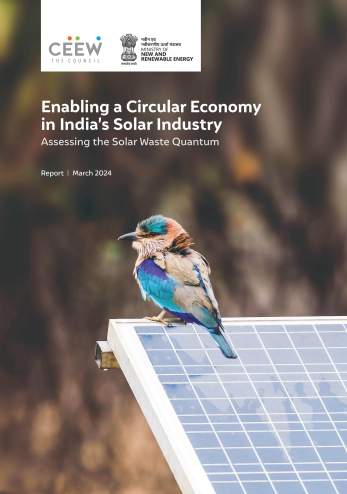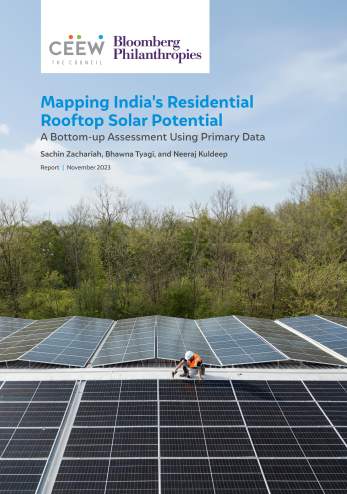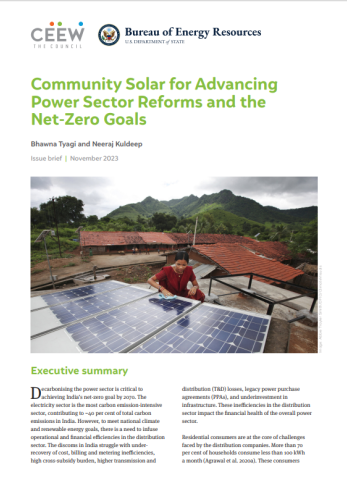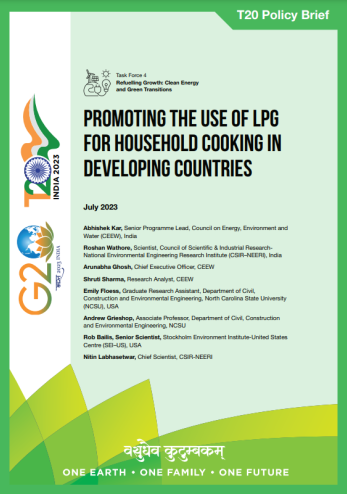



Suggested citation: Gupta, Akash Som, Bhawna Tyagi, Neeraj Kuldeep and Selna Saji. 2022. Unlocking Demand for Residential Rooftop Solar in India: Learnings from Solarise Delhi Campaigns. New Delhi: Council on Energy, Environment and Water.
This study presents results, challenges and learnings from the Solarise Delhi campaigns - a discom-led, community-based demand aggregation and awareness pilot for rooftop solar (RTS), implemented by the Council on Energy, Environment and Water (CEEW), in two urban areas of New Delhi. The campaigns were co-led by the U.S. Department of State and India's Ministry of New and Renewable Energy (MNRE) under the U.S.–India Clean Energy Finance Task Force. The pilot aimed to assess the effectiveness of peer-to-peer influence and end-to-end RTS support in increasing RTS adoption in residential communities.
With a technical potential of 210 GW in urban areas, residential rooftop solar (RTS) holds critical importance in achieving India’s ambitious target of 500 GW of non-fossil fuel capacity by 2030. RTS also presents economic and environmental savings for consumers and electricity distribution companies (discoms). However, RTS deployment in general has remained poor – 6.4 GW of installed capacity against the total solar installed capacity of 49.34 GW. Several factors, such as high capital cost, lack of financing options, and insufficient levels of information dissemination limit adoption in the residential sector.
To accelerate residential RTS adoption in India, the U.S.–India Clean Energy Finance Task Force, co-led by the U.S. Department of State and India’s Ministry of New and Renewable Energy (MNRE), piloted the Solarise Delhi campaigns. These were modelled on the Solarise campaigns popularised in the United States but tailored to the local context. The Solarise campaign pilots were implemented by collaborating partners of the Task Force— the Council on Energy, Environment, and Water (CEEW), SmartPower Inc., and WeeGreen Inc.—along with the local discoms and Resident Welfare Associations (RWAs) to increase the adoption of RTS at the household level. Solarise campaigns, which proved to be high-impact local community campaigns in the United States, intend to increase the adoption of RTS in residential areas by leveraging community trust and through peer-to-peer influence.
Two discoms in Delhi—BSES Rajdhani Power Limited (BRPL) and BSES Yamuna Power Limited (BYPL) —proactively led the pilots of community-based Solarise campaigns. Three solar vendors were identified by the discoms for the campaign. The Solarise campaigns were conducted completely in a virtual mode due to the restrictions imposed by ongoing COVID-19 pandemic. Dedicated campaign websites developed using the WeeGreen platform facilitated consumer RTS purchases by providing access to solar vendors, campaign information and activities, and cost and technical knowhow on rooftop solar. The pilot campaigns spanned a period of three months, from November 2020 to January 2021.
The campaign activities educated consumers about potential benefits of RTS, and demystified myths. Capitalising on the power of community trust, local ambassadors motivated the community members to adopt RTS by initiating dialogues and word-ofmouth recommendations. Finally, the availability of trusted solar vendors and end-to-end consumer support helped activate the consumers by providing a trustworthy and accessible opportunity to adopt RTS.
The scalability potential of the Solarise Delhi campaign pilots to larger areas within Delhi and other Indian cities was assessed. Thus, the key performance indicators captured the ability to aggregate demand using awareness and peer-to-peer influence tools. Some of the key performance indicators covered include the extent of consumer engagement, potential for rooftop installations as indicated by the number of proposals (and the related RTS capacity) offered to consumers, changes in consumer awareness levels, and perceptions about RTS.
The campaigns engaged more than 400 consumers through virtual events and an additional 1,000 consumers through interaction with WeeGreen websites created for the Solarise Delhi campaigns. The two campaigns, spread across 12 weeks, elicited a total of 117 leads, primarily generated through WeeGreen websites, a hotline number, and social media. Of the total leads generated, partner vendors shared detailed proposals with 22 leads with a potential capacity of 140 kW. This represents a 18.8 per cent lead-to-proposal conversion. Assuming a majority of proposals would have converted to contracts under non-COVID conditions, the results are comparable to the Solarise campaign results in the United States. The lead generation and conversion in Solarise Delhi entirely during the pandemic conditions are comparable to the number of leads and contracts signed in two pre-COVID Solarize campaigns in Rhode Island in the United States under optimal conditions during the summer of 2019, through Solarize Narragansett (108 leads, 16 contracts) and Solarize Jamestown (223 leads, 29 contracts).
The pandemic necessitated a sub-optimal operational mode for conducting the campaigns in two primary respects. First, the critical campaign element of peer-to-peer influence was greatly limited due to social distancing (a restriction to stop the spread of COVID-19), which significantly lowered the impacts of the campaigns. The U.S. experience shows, and the Indian experience re-affirms, that in-person interactions and word-of-mouth recommendations are critical elements of Solarise campaigns. Second, India’s systemic lack of suitable financing options for residential consumers and the economic uncertainty arising from the COVID-19 pandemic contributed to consumer hesitancy or postponement of large purchases such as RTS. The availability of affordable financing was a key component of Solarise campaigns in the United States, turning consumer motivation into a successful RTS installation. However, financing options were very limited in the Solarise Delhi campaigns, severely restricting the volume of installations. Though the Solarise Delhi campaign yielded only one indirect RTS system, the indicators suggest a high degree of latent demand and interest among India’s price-conscious residential consumers as a result of the campaign.
Utility-led, community-based Solarise campaigns offer tremendous potential for unlocking the latent demand in India’s residential rooftop solar sector. However, this demand aggregation business model requires ecosystem support to convert consumer awareness and subsequent interest into on-the-ground installations.We offer the following recommendations in the fervent hope that they provide the necessary support to scale the Solarise model.

By bundling together information in one place, providing compelling offers, and leveraging community trust, the Solarise pilot campaigns very effectively initiated conversations and elicited consumer interest in RTS in an innovative manner. The pilots demonstrated that virtual campaigns can play a key role in raising awareness and aggregating demand using social media, virtual meetings, community networks, and direct conversations. When implemented primarily as in-person campaigns, complemented by an online platform, these campaigns would be more effective in turning awareness and subsequent interest into on-the-ground installations for residential consumers. With committed stakeholders and a supportive ecosystem including financing options, Solarise campaigns (and campaigns of a similar nature) can become a powerful tool for increasing RTS adoption in the residential sector.

Enabling a Circular Economy in India’s Solar Industry

Mapping India’s Residential Rooftop Solar PotentialA bottom-up assessment using primary data

Community Solar for Advancing Power Sector Reforms and the Net-Zero Goals

Promoting the Use of LPG for Household Cooking in Developing Countries